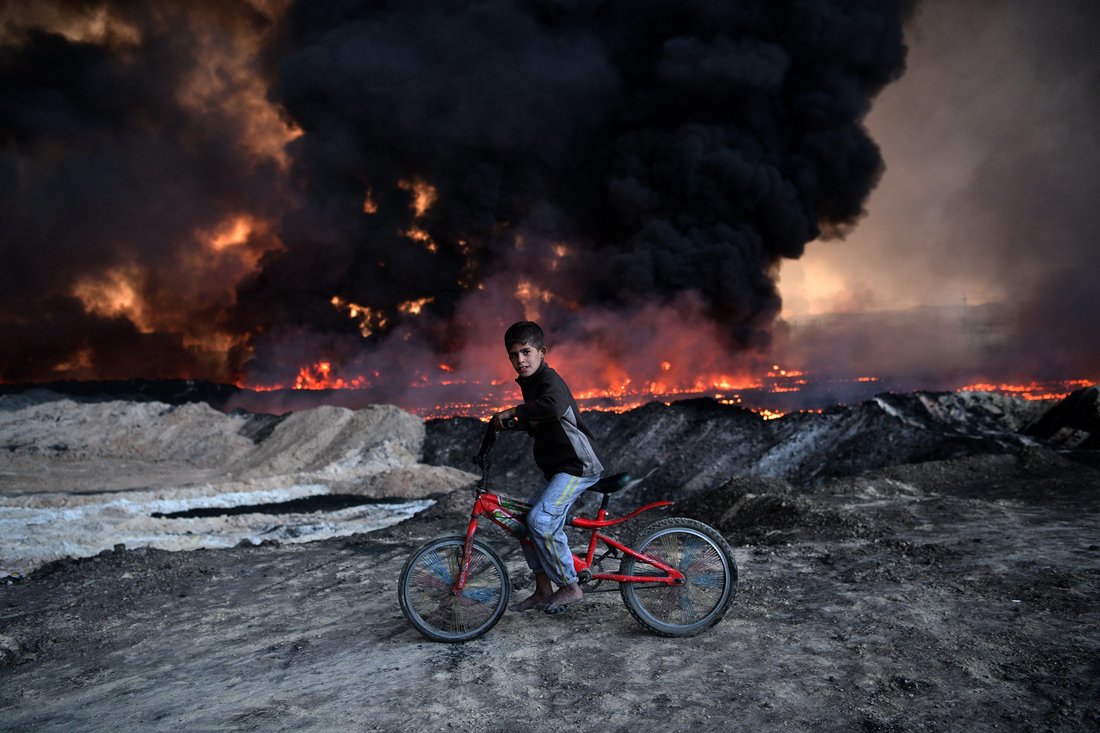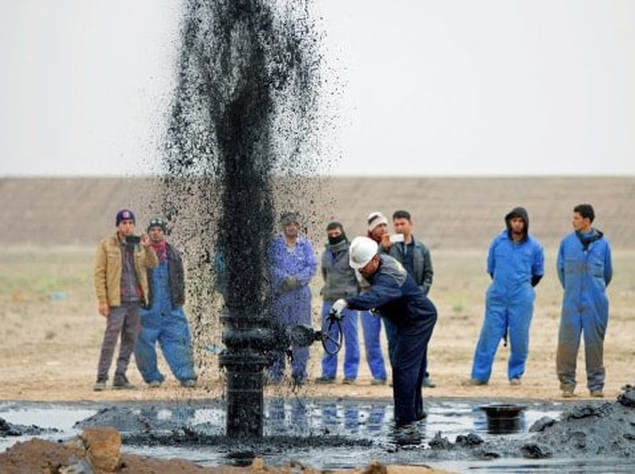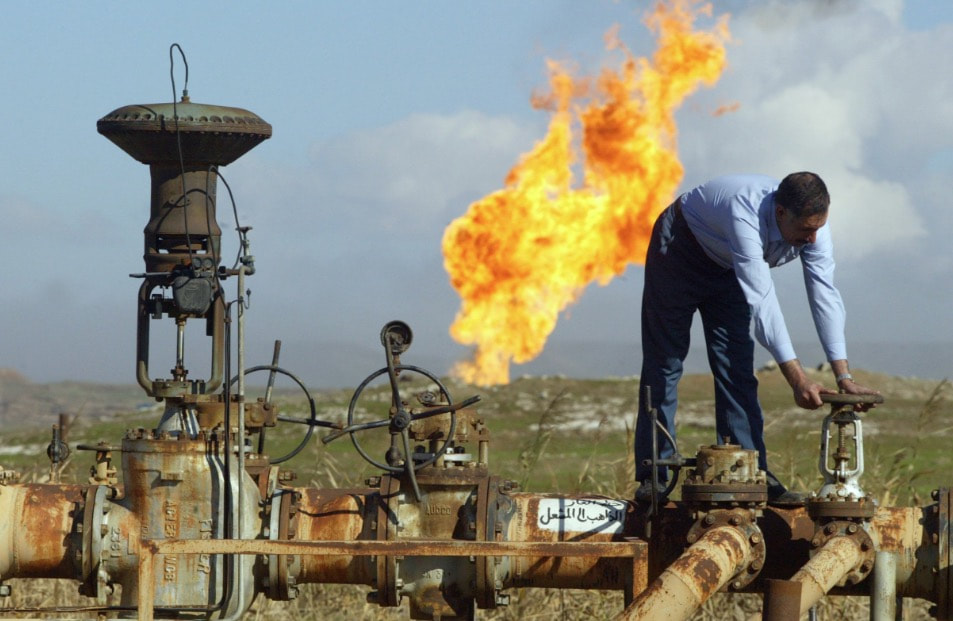Putting aside the economic diagnosis interventionists touted a decade before now, neither oil nor its abundance has proven enough to steady Iraq’s economic ship, battered by years of sanctions, turmoil and the imperialist undertakings of intervening powers.
The fiscal regulations and policies architected by Iraq’s pre-2003 government to keep the economy wholesome were eradicated overnight, by American and allied forces. Poverty and inequality (certainly in existence before then) rose aggressively after structural adjustments to Iraq’s command economy nourished rather than redress these twin demons.
The promise of growth has been repeatedly sold, without ever transpiring.
In his speech to the White House a day prior to the fateful invasion in March 2003, former US president George W. Bush mentioned oil once, but only to warn the future insurgency from “destroy[ing] oil wells”. Oil, Bush at the time said, is “a source of wealth that belongs to the Iraqi people”. The warning served only to clear the path, militarily and rhetorically, to allow America to seize the wealth and distribute it between themselves and allies.
Yet, historical records live to tell us the story of Iraq’s once diverse and robust economy, compared with other Arabian peninsula states. Geographically its location has favoured the development of agriculture, whose growth patterns were mirrored by sister industries. A case in point that American physician and peace activist Dhalia Wasfi has spoken at length about is Iraq’s centrally controlled seed industry which prior to 2003 had developed “a rich seed variety for almost every variation of wheat in the world”. The bank, she explains, “dated back to thousands of years, since the earliest farmers” but now “It’s gone”. Both the survivalist seed industry and centrally planned economy were dismantled with predictable outcomes and reverberating results.
Since 2014 the price of oil has taken a huge fall from the historic high of $155 per barrel that it had enjoyed in the previous decade. Currently the price stands at a much lower $57 per barrel. Part of this is due to the slowing growth in oil consuming economies such as China as well as the growth in new oil extractive measures such as fracking in the United States and Canada. In contrast, Iraq’s non-oil economy in 2015 had shrunk by 14% following a 5% fall the year before, and the slump is expected to sink by a further 8% due to low demand and ongoing insecurity.
Economic Mismanagement
Assuming the seat of Iraq’s command economy was the informal economy, but whose scope even prior to 2003 contracted and expanded in tune with economic crises. Though difficult to measure in impact, both local and foreign, state and non-state actors, have monopolised the field. From the illegal sale of counterfeit goods, money laundering to the circulation of black money and oil smuggling, these are all consequences bred by the absence of legitimate governance and the perception of illegitimacy the public, in turn, harbours towards it’s rulers. At the fiscal level, when oil slumps informal trade takes over, and thus illegally acquired or unaudited revenue flourishes. This has been most visible over the last 8 years, when the price of oil plummets, and without “fund for the future” to cushion Iraq’s economy against the shock, resuscitates the information sector. Violence (or its prevalence rather) similarly throws a spanner in the works, driving foreign investors away who leave behind roles that local or regional actors compete over, but the trade of oil never comes to a halt.
Civilian neglect is once again the recurrent theme. The present elite’s obsession with oil wealth has led to an an increased lack of competitiveness in non-oil sectors, high unemployment rates and the growth of a sector that favours specialised skills brought in from the outside by foreign oil companies, instead of recruiting from the local labour force. This is a method Chinese firms awarded contracts in Iraq are renowned for. Anticipated violence also brings unwelcome private military contractors to protect oil installations. Though undocumented but common knowledge in Basra, labourers from Bangladesh are imported to allow firms to steer clear of unreckonable tribes who they may find themselves in conflict with if one its members and the foreign firm have a falling out.
The language of booming growth is little more than a thin veil to dress up the disinterest of elites as concern, excusing at the same time America’s external response and prolonged theft of Iraq’s oil and the mutual returns Iraqi politicians are rewarded. Knowing full well that oil revenue alone does not guarantee growth, occupying powers and their stooges promote a discourse that sanctifies oil as a blanket solution to raise optimism among the occupied population and foreign donors, to sustain this charade. The reality however is that within oil rich provinces, particularly in the south, an alarming 30 percent of communities subsist below the poverty line, while an additional 13 percent of Baghdad’s residents can barely lift their heads above it.
Mosul’s liberation has spawned a similar discourse, which rehashes the same myth. Glaringly absent from the equation fed to tabloids and broadsheets however, is talk of the revolving door of corruption kept spinning by not only debt but also the flood of aid money poured in for reconstruction. Reconstruction efforts in 2003 were not financed by the occupant power but by those it occupied, whilst the government too was plunged into an ocean of debt.
Across the last decade of US encroachment, no attempt at establishing a sovereign wealth fund has been made such as that in Norway and Alaska. The advantage is that such a fund provides oil producing countries with vital savings that could be useful when the price of oil falls, and to attract non-oil investors to stimulate other sectors outside the oil industry. Recognising its own dependence on oil exports, Saudi Arabia has committed towards economic diversification through the establishment of the world’s largest sovereign wealth fund by 2035. Without these reserves, Iraq’s non-oil economy is unable to absorb and reduce any hemorrhage to the economy for now and the foreseeable future. Aid money from donor states helps to grease the wheels of the economy and keep up the appearance of ‘development’. If revenues are embezzled or inexcusably misappropriated, as they so often are, oil wealth does nothing to reverse precarious living conditions limited health care and electricity, water provision or access to adequate sanitation. If dissent arises or a hint of the risk of exposure, private payoffs will be distributed to close down investigations that could blow the lid off the government’s illicit activities — corruption-based patrimony for lack of a more accurate term.
Corruption at the state level has also been matched by the illicit activities of non-state actors and terrorists. Up to 2 million litres of oil has been smuggled every day out of Iraq since the mid-2000s while oil ministry data suggests that up to $4.2 billion in barrels disappeared in 2005 (Iraq Oil Ministry). A significant amount of oil is thought to have been smuggled into Iran, however, cheaply available stolen Iraqi oil has also found its way to foreign oil companies that sell it on the international market. Everyone other than the people of this resource-abundant state appear to be cashing in. These facts, alongside price shocks, the sharp appreciation in domestic currency and limited capacity to create jobs beyond the oil sector, have unleashed the so-called resource curse, the weight of which society has bore. Oil should be a significant but complementary component to a dynamic economy that guarantees a high standard of living for all citizens. Escaping the curse lies in the policies of responsible management and a commitment towards economic diversification, which may not satisfy foreign investors and those guided by their vested interest in Iraq’s black gold.
Conclusion
Oil alone does not make Iraq prone to negative growth, or denies it diversification, but the arrangement of power as architected by American officials has roused the greed of Iraq’s post-2003 elite. Dependence is only one face of the problem, oil governance is the other. Looking towards the near future the prospects for Iraq's economy don’t look positive. The projection suggests that the Iraqi government could struggle to pay its civil servants or keep its promise to build roads or power stations in 2018, factors that will make the growth and maintenance of non-oil economy sectors such as agriculture and manufacturing incredibly difficult. Today’s uncertain policy environment has kept open gaping holes in the fabric of governance and carved out new pathways to corruption. The inability or unwillingness to combat corruption feeds the informal sector, which is not to be confused with non-oil sectors. while the possibility is there for Iraq to escape from the hallmarks of this curse, diversification will remain elusive until Iraq can solve the problem of corruption and rent




 RSS Feed
RSS Feed